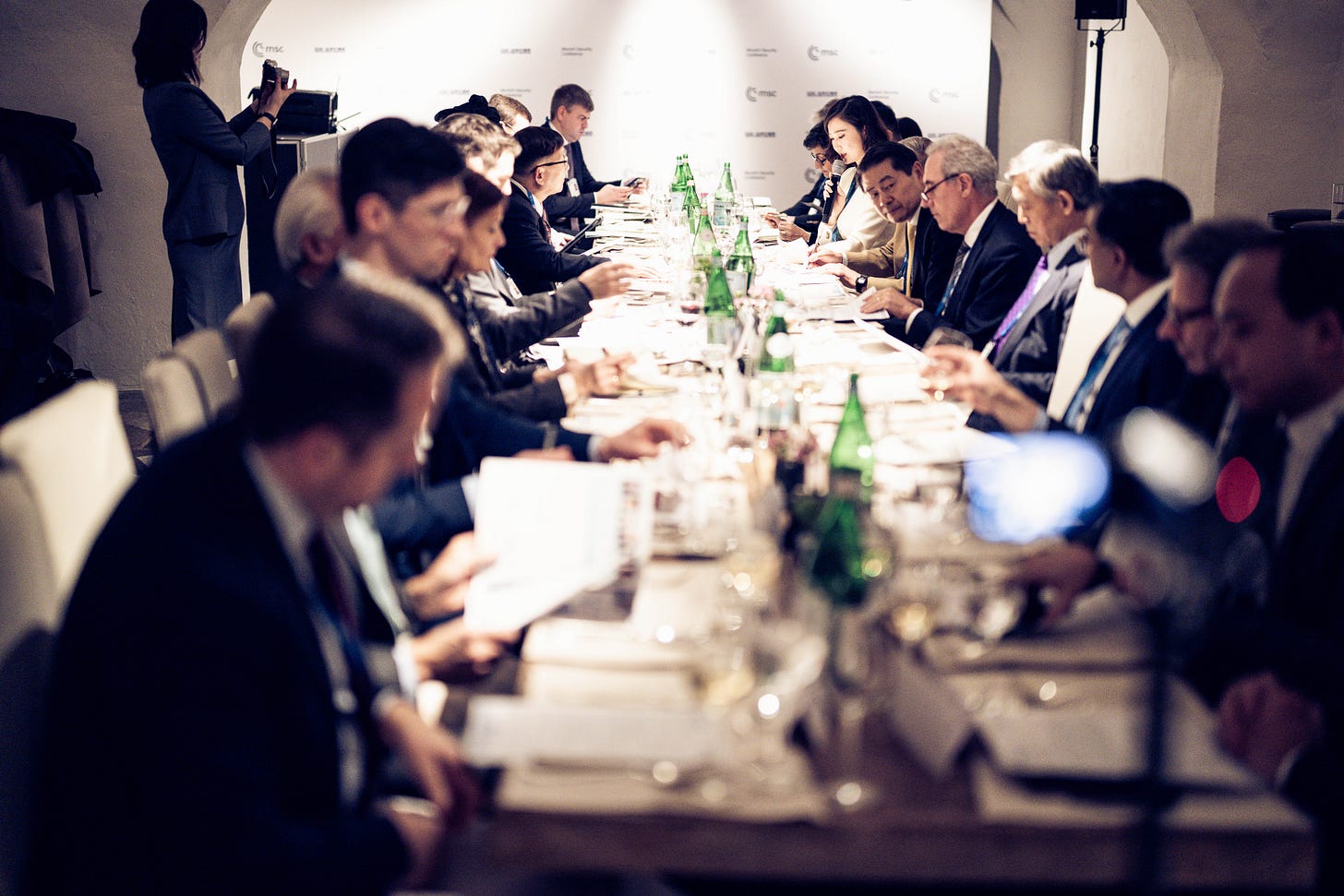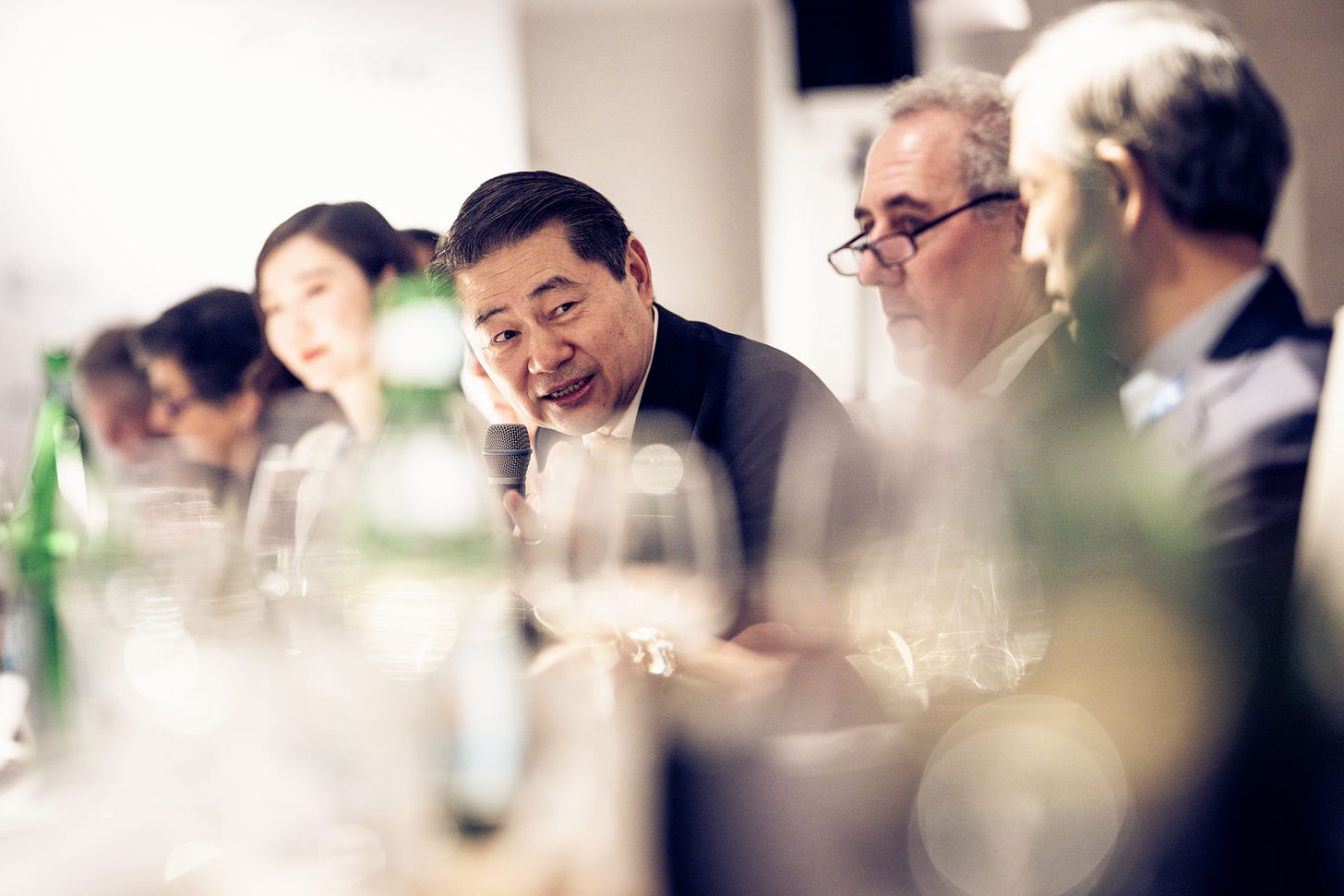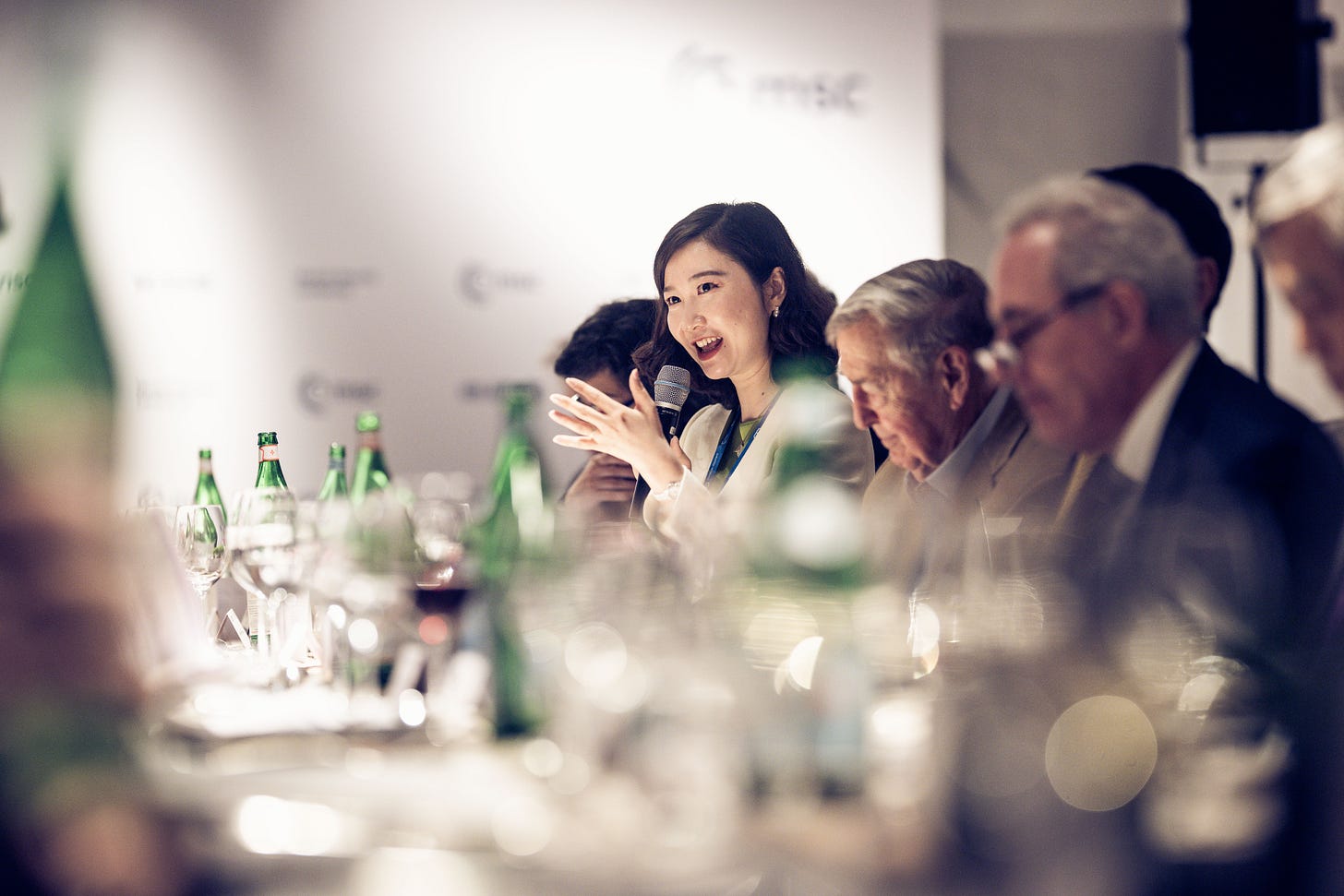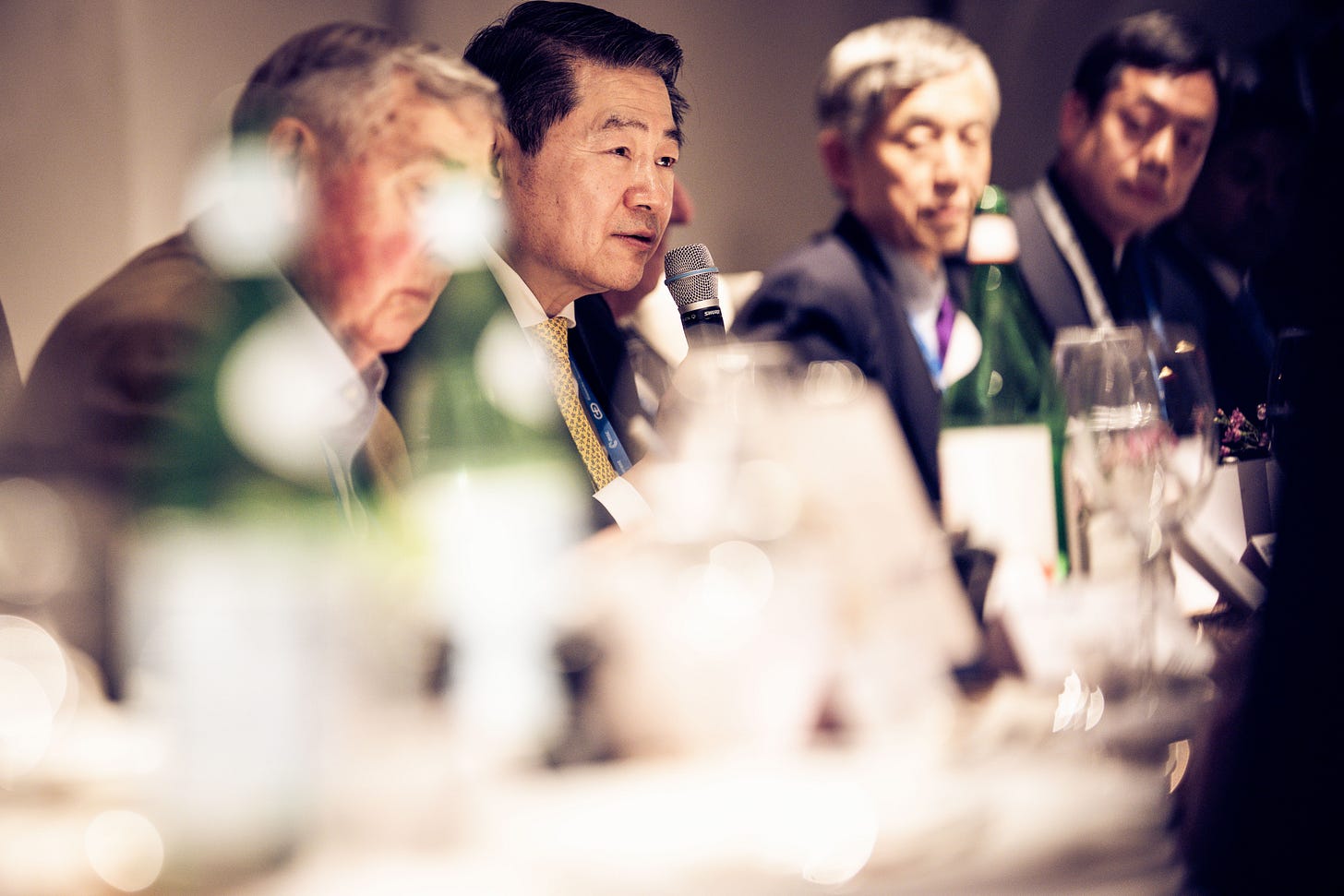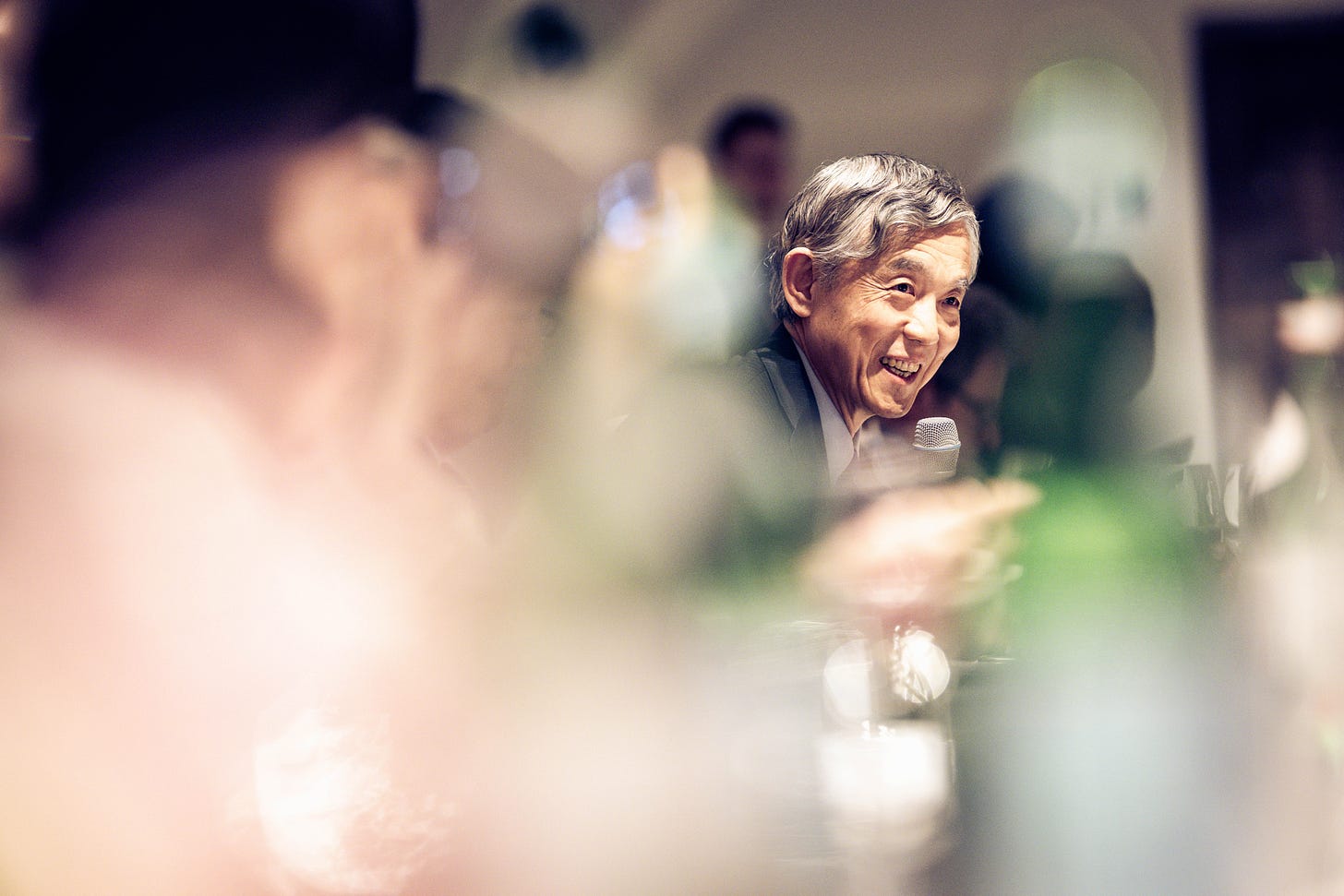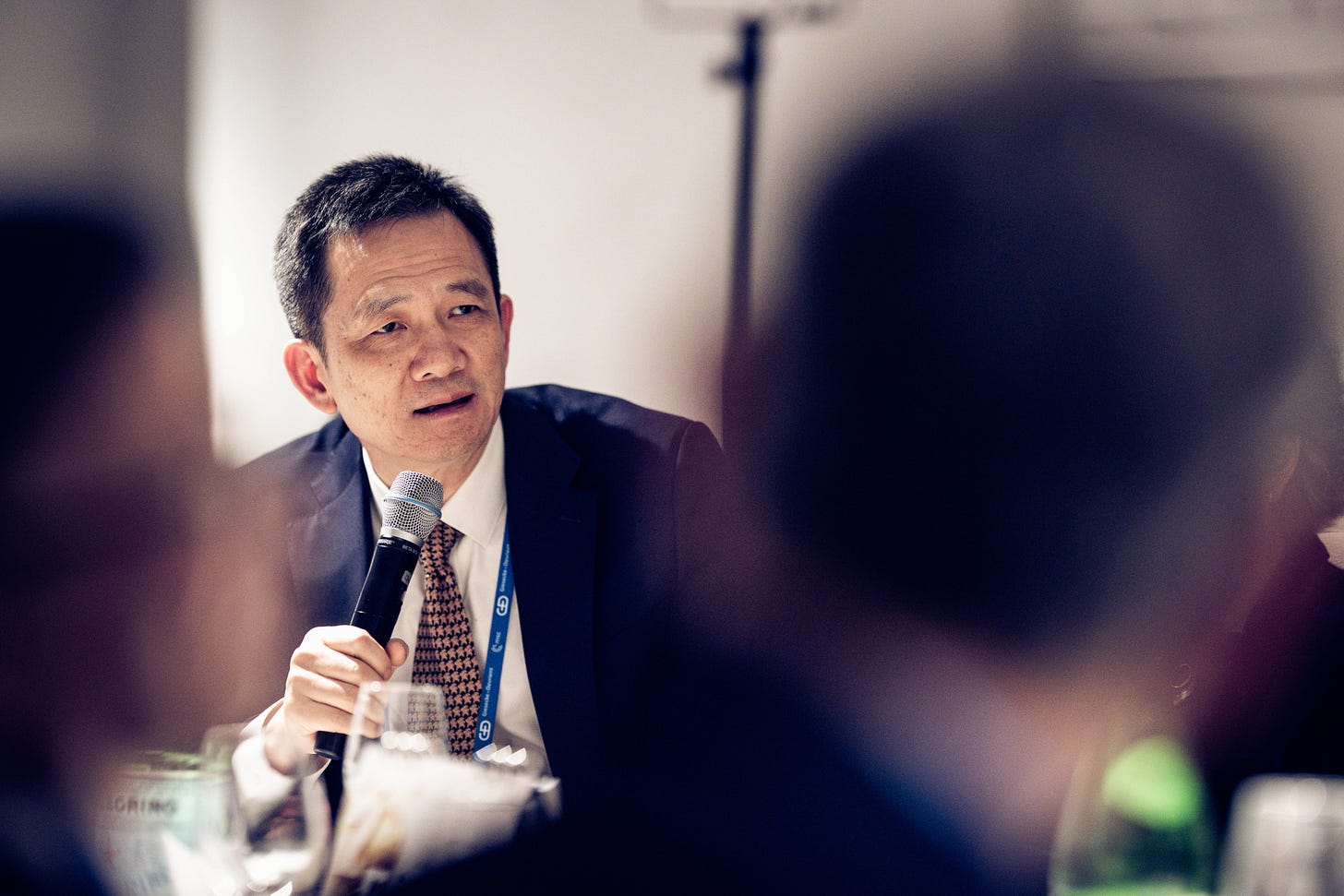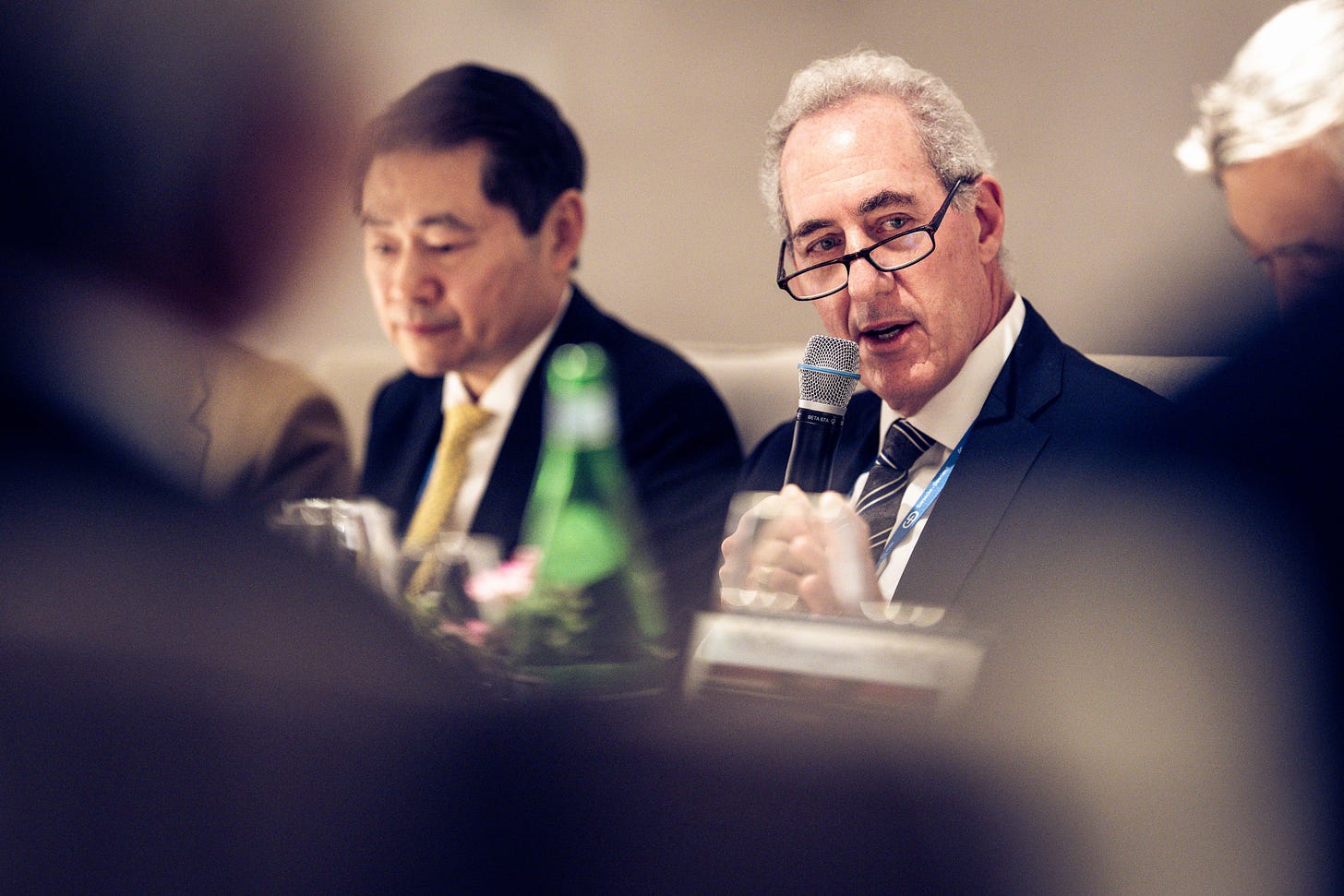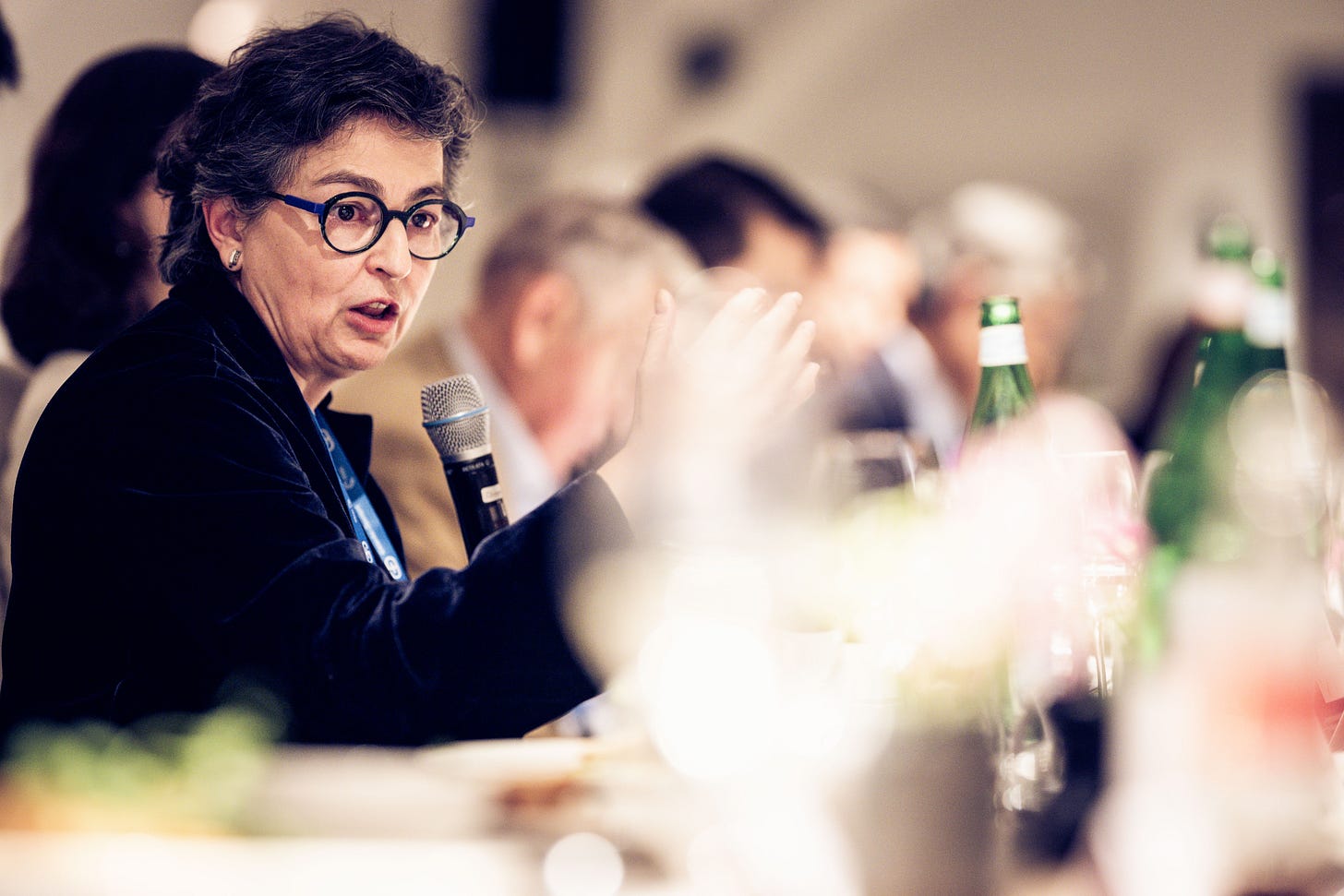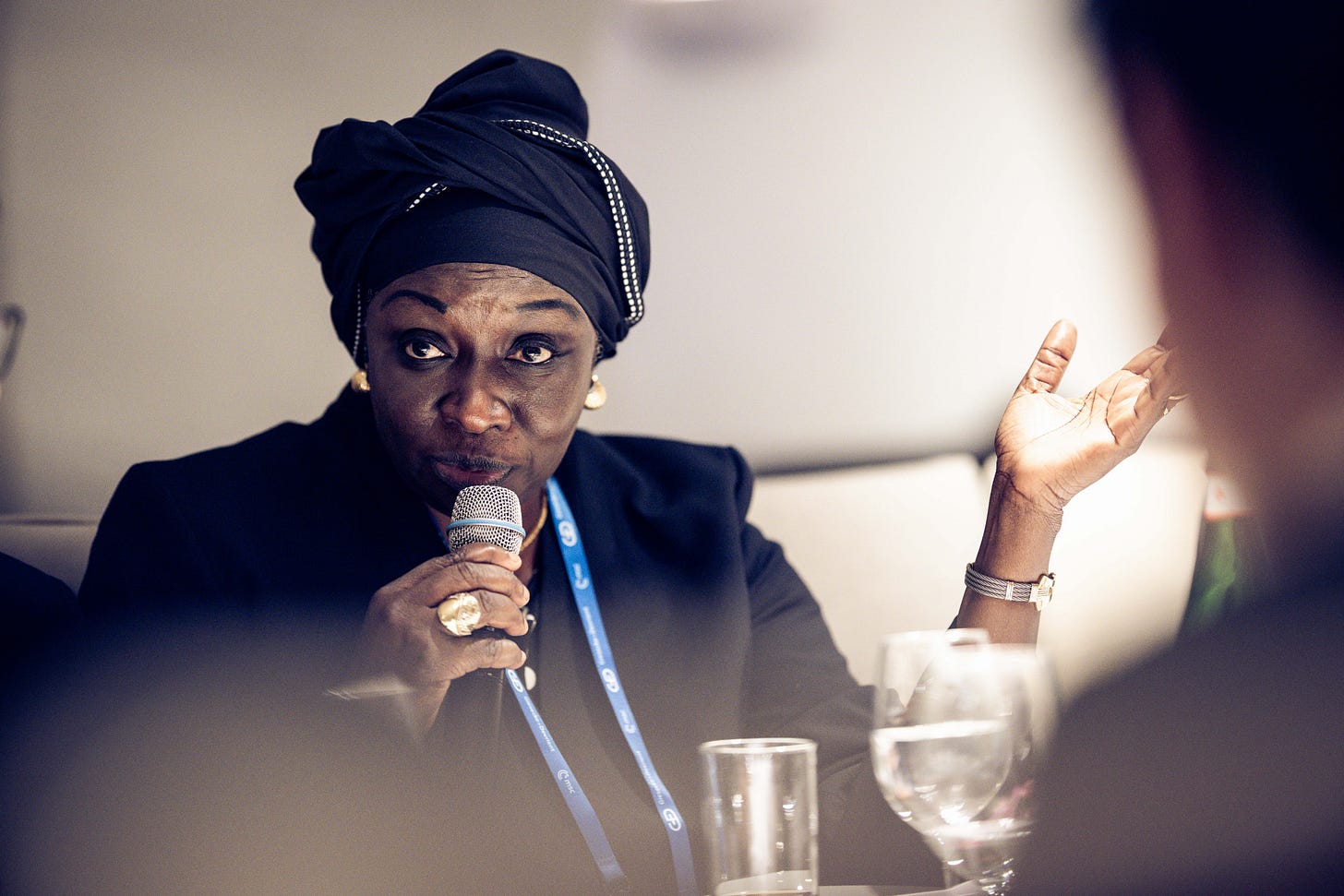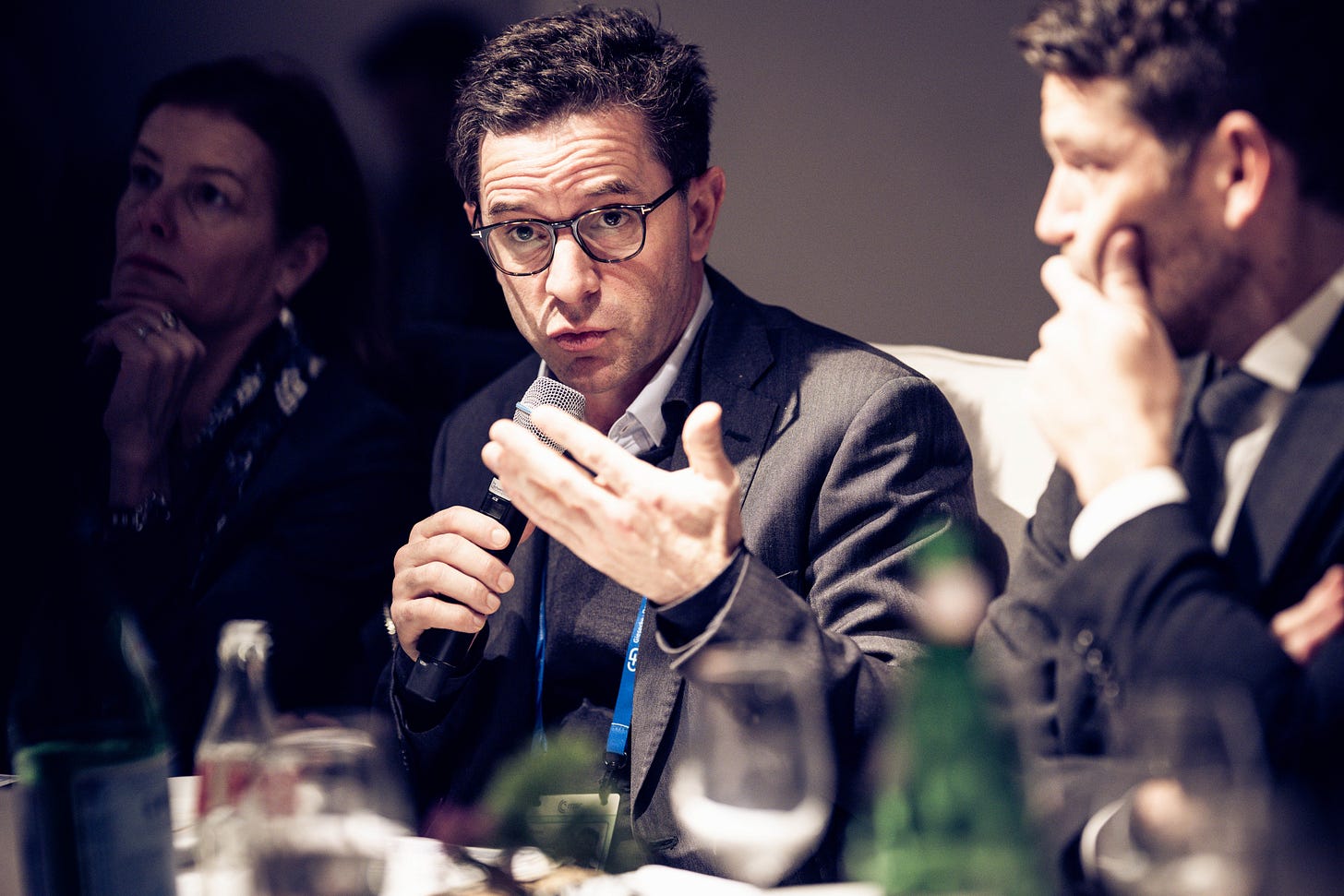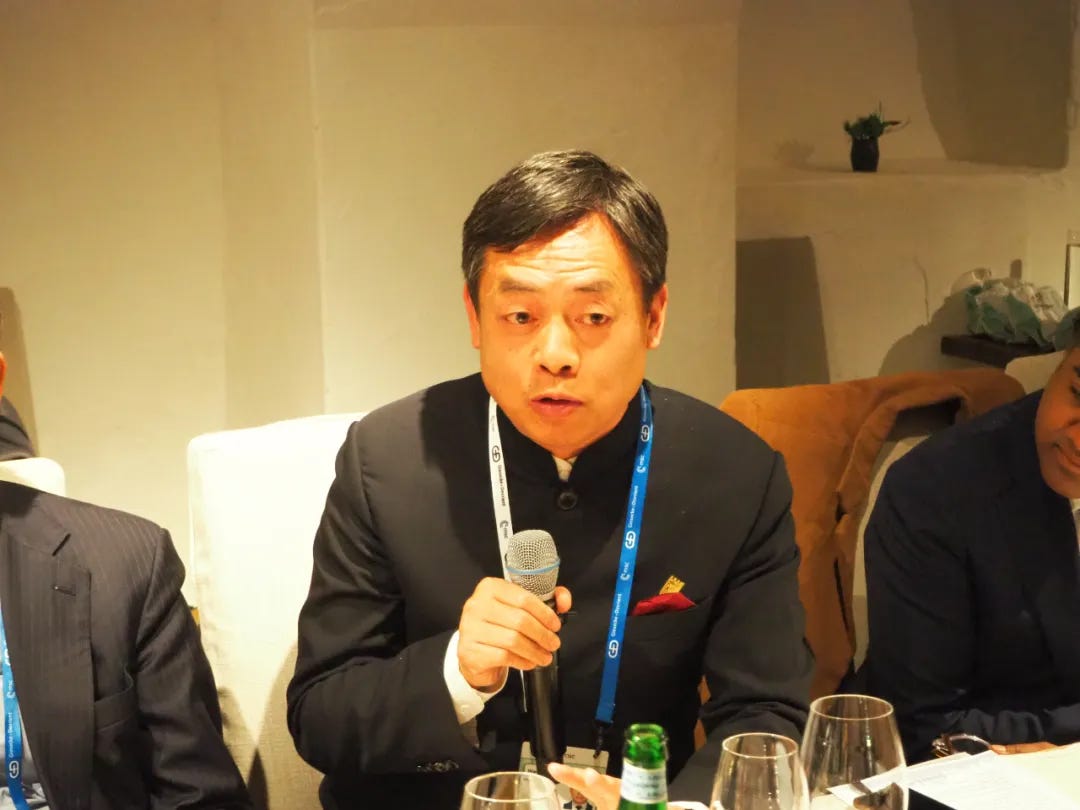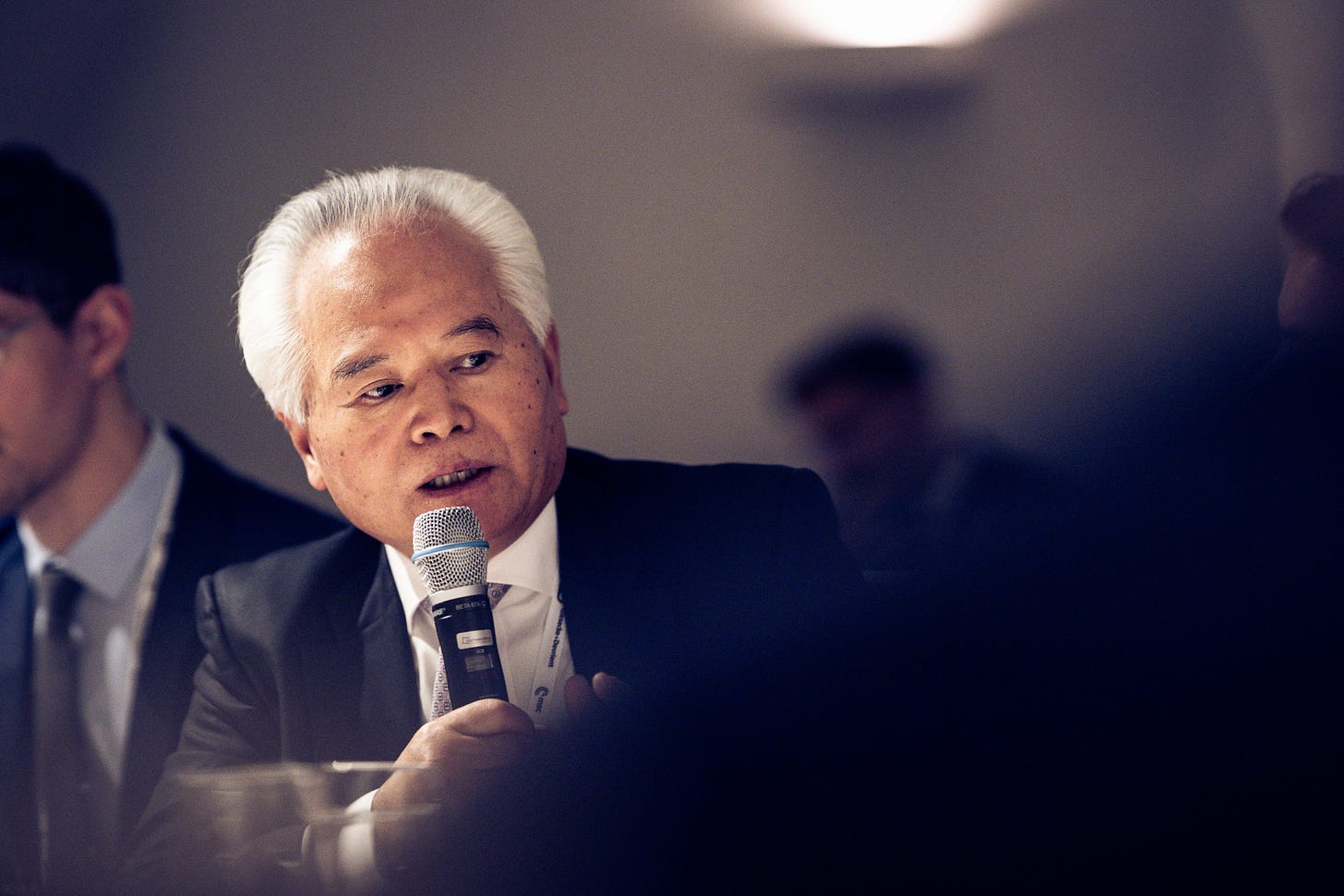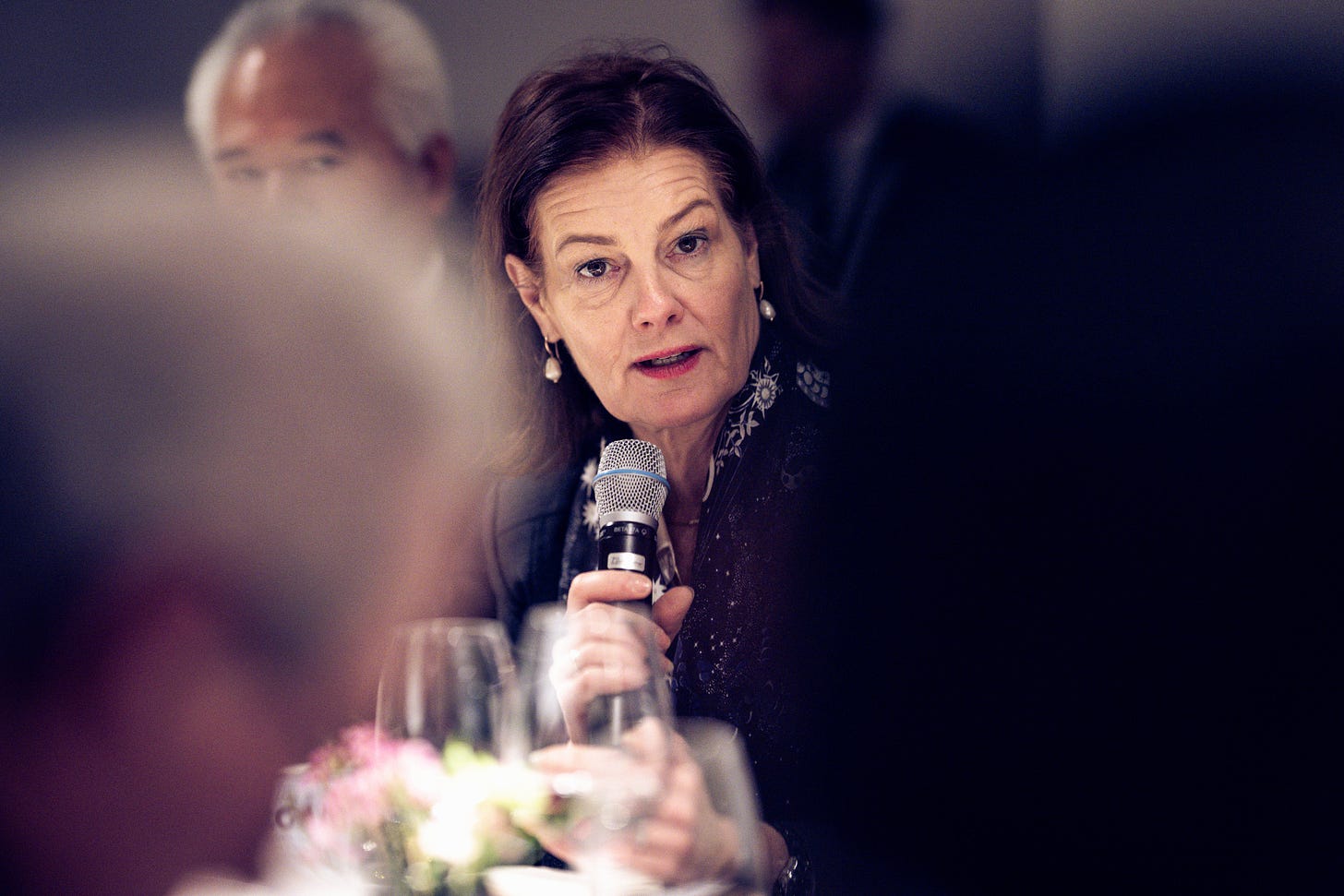Transcript: CCG's side event within Munich Security Conference 2025
Remarks by Xue Lan, Yao Yang, Michael Froman, Arancha González Laya, Graham Allison, Daniel Kurtz-Phelan, Danilo Türk, Aminata Touré, Cheng Li, Justin Vaïsse, Wang Yiwei, Wu Shicun, & Ngaire Woods.
On February 15, 2025, the Center for China and Globalization (CCG) hosted “Writing on the Wall? The China Playbook 2025,” a side event within the Munich Security Conference (MNC). For years, CCG remains the only Chinese organisation to host side events within the MNC.
The event, moderated by Henry Huiyao Wang, Founder and President of CCG, attracted prominent Chinese and international guests.
Below is the transcript, based on an audio recording and it has not yet been reviewed by the speakers.
Mabel Lu Miao, CCG Secretary-General
Ladies and gentlemen, good afternoon. I'm Mabel Miao, Secretary-General of the Center for China and Globalization (CCG). On behalf of CCG, it's my great honor and pleasure to warmly welcome all of you and thank you for joining us. I know the Munich Security Conference schedule is so busy, but I appreciate all of you participating in our events. CCG is one of the globally recognized thin tanks and China's largest non-governmental think tanks. Since 2008, we've devoted ourselves to studying globalisation and China's role in it. And since 2018 we've become the proud partner of the Munich Security Conference.
Every year, we co-hosted a side event with the Musich Security Conference. Since that year, our events were joined by global thought leaders and distinguished guests including John Kerry, Jennifer Morgan, and many others. Of course, on the table, I'm so glad to see so many familiar faces and old friends of CCG have joined events in the Music Security Conference, like Arancha, Dan, and many others, and new friends, of course. Our old friend Professor Graham Allison, is due to join the book talk later with Henry at the bookstore. And our Chinese colleagues like Professor Xue Lan, Professor Yao Yang, Professor Li Cheng, and Professor Wu Shicun.
Multipolarity is the theme of this year's Munich Security Conference. Earlier in Berlin, I remember Henry was part of the Kick-off to this year's annual report and remarked on China's position. China is actually contributing in various domains, while the world itself is becoming increasingly complex and multipolar, bringing greater uncertainty and diversity. As a result, global affairs should not be viewed only through the lens of autocracy versus democracy, or neoliberalism versus authoritarianism. The real challenge now may be a border divide between the West and the rest of the world, a shift that challenges deeper reflection.
To bridge this divide, it is crucial to develop strategies to innovate multipolarity, strengthen global governance and multilateralism, foster cooperation, and handle shared global challenges. I remember CCG translated the report of the Musich Security Conference into Chinese and disseminated it in Beijing circles. There has been a lot of reflection on this report. Later, we can hear more. This luncheon event is focused on the inner dimension of China. Some Western audiences may be sensitive to the word 2025, but right now we're in 2025. Indeed, it's a crucial year for China and a period of transformation marked by the conclusion of its 14th Five-Year Plan and the preparation for the 15th Five-Year Plan. The world is in turmoil as international trade and diplomacy are being increasingly dismantled by the second Trump presidency. I believe our audiences and guests today can join in two questions. One is how China will enhance economic resilience amid domestic reforms and U.S. policy. Another is how China will navigate its role in multipolar platforms and reforms. We're honoured and pleased to have leading Chinese experts who are the best people to answer the questions from angles ranging from foreign policy, and technology, to economy.
Maybe at the very beginning, I would like to invite Professor Wang, who is the Founder of the CCG, and also former Counsellor of the State Council of China, to say some words. Later, we can invite Professor Xu Lan and Yao Yang to give us some keynote speeches. And, of course, we would like to invite Professor Allison, Minister Arancha González, and Michael Froman, President of the Council on Foreign Relations and former U.S. Trade Representative, to talk about this topic. Henry, the floor is yours.
Henry Huiyao Wang
Thank you, Dr. Miao, for the opening remarks. I don't want to spend too much time making too many opening statements, but I would like to highly praise the distinguished guests that are gathered around this table. I think that today is really a great time that we are gathered here in Munich. We're gonna talk about this crucial 2025. We have already a new administration in the U.S. now, Trump 2.0. The EU just had a new Parliament since last year. And of course, China gonna finish the 14th Five-Year Plan in 2025. Also, we're gonna have a new Five-Year Plan coming up. So the idea of today is that we hope that we have two Chinese senior scholars to share a bit about their views. I'd like to have Mike Forman, Arancha González, and Graham Allison give some input from the international side. And then we open up to all our distinguished senior experts and representatives to give your views of things going on. I just want to say that China is actually not doing too badly for year of 2024. They have achieved the 5% of GDP growth. Its green power has also greatly developed, producing 13.17 million new energy vehicles, and its wind and solar power capacity exceeded 1.3 billion kilowatts. So there's a lot of things going on.
It's interesting that President Trump is launching the economic tariffs now on all fronts. When Trump took office, he announced a 10% tariff on Chinese goods and imposed a 25% tariff on steel and aluminium products from all countries. That probably is going to drive all the countries to do more domestic reforms. I see the U.S. is doing that. How that is gonna impact every country is also quite interesting. And obviously, President Trump is less ideological. His practical and transactional approach may lead to improvements in Sino-U.S. Relations, as Graham noticed as well. President Xi Jinping has already had a phone conversation with President Trump, so we hope that he can visit China soon, and there may be opportunities for cooperation on key global issues such as the Russia-Ukraine conflict, the Israel-Palestine situation, and even the Korean Peninsula.
Sino-European cooperation is also ripe for renewal, particularly in the realm of electric vehicle tariffs. Both sides will likely work to manage their differences, build trust, and reach mutually beneficial agreements. The EU-China Comprehensive Agreement on Investment (CAI) could also be revived. In the field of AI, at this year’s summit in Paris, 61 countries signed a declaration to create an inclusive and sustainable AI governance framework.
For today's roundtable, I would like to start with Professor Xue Lan, Dean of Schwarzman College at Tsinghua University. He is also an expert on AI and was just at the AI Summit in Paris. We've known each other for probably 30 years. You know, significant breakthroughs have been made in technology and science development in China. Maybe you can give a bit of opening remarks on that subject. And I also like to ask Professor Yao Yang to say a few words. And then we open up for keynote input from our senior experts on this table. So Xue Lan, please.
Xue Lan, Cheung Kong Chair Distinguished Professor and Dean of Schwarzman College, Tsinghua University
Thank you very much for inviting me to this fascinating event. In fact, this is my first time at this conference and I didn't realize that you could also talk about other things other than security. So I'm very happy to be part of this dialogue.
I saw the topic of this luncheon is the Five-Year Plan, so I thought I was gonna be asked about the Five-Year Plan. I was on the expert committee for the previous Five-Year Plan. I also have already participated in some discussions about the 15th Five-Year Plan. Many efforts are going to be focused on drafting that plan this year. For those of you who know about this, the Five-Year Plan is a process that engages the national effort, with all the academics, government agencies, and also many of the public involved. There are also provincial and city-level Five-Year Plans and sectorial plans. Based on some discussions that I've attended, let me just make some brief remarks on this instead of innovation because I wanted to follow your script.
First of all, a summary of the 14th Five-Year Plan: what's been achieved and what's not. In general, most of the initial targets set five years ago was pretty much achieved, and some were actually surpassed. There are also some targets that have not been achieved. The few, I remember, were in the health and education sectors. I was quite surprised by that.
But let me move on to the 15th Five-Year Plan: what are some of the priorities that people have discussed? Again, you will notice this is very much domestically oriented. China's Five-Year Plan was initially called the economic plan and now it's called the economic and social plan. Now people are saying more dimensions should be included. Now it's a national development plan. Whether the name will be changed is yet to be seen. I think the first thing people are concerned about is economic growth: whether there should be any numerical targets being set, and if so, then how much. 4%? 5%? There is some disagreement on that. That's one priority.
The second is about the so-called growth quality. China has been advocating for high-quality growth. So what does it mean? People talk about many dimensions of that, including a more balanced and diversified economic structure, more balanced rural-urban development, particularly the regional balances and how to maintain the achievements of the poverty allegation effort. In some places, the poor people do seem to be on a kind of a backtrack. So people want to make sure that indeed, those people who are out of poverty continue to be out of poverty. That's the second dimension, growth quality.
The third is on innovation and digital economy: how to continue to promote S&T development and innovation and make sure that S&T remains the main engine of China's economic growth. There is also, of course, the continued promotion of the digital economy, including the diffusion and application of AI technology in various domains.
The next one is on sustainable development. As we know, China has promised to achieve carbon peaking by 2030. So how can China do that? That's not a simple task. There are a lot of calculations of how you might do that and so on. So I think that's another major issue.
The next item people talk about is openness: how to further promote openness and international engagement. This is a very complex dimension, particularly given the current geopolitical situation. But again, China is very much determined to do that and there are many efforts. I'm glad to see Mr. Wu Shicun is here. Hainan is certainly a very big effort in the free trade zones.
And finally, the governance. China is already working on the so-called modernisation of China's governing capacity. There's also a plan for achieving that. This is a goal that would also be brought into the overall plan, trying to make sure that the rule of law and other elements of the governing capacity will be modernised. So let me stop here. Thank you.
Henry Huiyao Wang
Thank you, Xue Lan, for outlining China's economic and S&T development. Those are really relevant for 2025 and beyond, and have a huge impact on China's relations with global community. Now I'd like to have Professor Yao, former Dean of the National School of Development at Peking University. As an economist, maybe you can talk a bit on the economic side, what's going on in China? How is the economy? How are things doing this year and next year, 2025?
Yao Yang, Professor, China Center for Economic Research, National School of Development, Peking University
Thank you, Henry and Mabel, for organizing this. This is really wonderful. Let me start with China's growth prospects. I understand that for a period of time, many people outside China were quite doubtful about China's growth potential. And there's a kind of saying that the Chinese economy is peaking. I think that's deeply wrong. Chinese economy still has a lot of fuel in its tank.
This is a concise session, so let me just pick up one thing, that is, China's investment in higher education. Higher education is becoming more and more important because China is moving into an innovative stage of growth. And the right comparison is not to compare China with the United States, right? As economists, we should compare China with countries with similar levels of income. So what are those countries? Brazil, Malaysia, etc.
Compared with those countries, China has done a wonderful, fantastic job in higher education. China now has four universities ranked in the top 50 in the world. If you look at AI publications, among the top 10 institutions in the world, China has four. Tsinghua is just behind Google, ranked No. 2. Our university, Peking University, and Zhejiang University are ranked No. 6. There is another university, I think, Shanghai Jiaotong University. So this is a lot. China each year produces over 10 million university graduates. That's a huge human resource pool. Anyone who doesn't believe in China's growth prospects will make a huge mistake.
Then how to explain the so-called slowdown of the Chinese economy over the last several years? Many people take that as a sign that China is going to follow the Japanese way of growth since the 1990s: deflation, slow growth, and also an ageing population. That's wrong. The slowdown has been the result of deliberate government actions. You have to understand that when it comes to the slowdown of the Chinese economy in the last several years. Starting in 2018, the Chinese government has deliberately started several programmes, even campaigns, to deal with the problems in the Chinese economy: over-leveraging or over-financialisation. I think this is very important for the international community to understand the Chinese economy.
One of the lessons that the Chinese leadership has drawn from the United States is that the United States has hollowed out its manufacturing sector mostly because the United States has too big a financial sector. That's why the Chinese leadership has begun this huge deleveraging campaign—it's really a campaign—to try to reduce the size of the financial sector.
To tell you the truth, my son made a mistake. He transferred from a data science company to a financial company. His salary, I tell you, is halved. The government just cut your salary by half. I mean, if you're in management, your salary is cut by two-thirds just to deter people from entering the financial sector.
Of course, that has a real effect on the economy. But I guess in the mind of the Chinese leaders, you know, the Chinese economy is robust and we can stand the slowdown. That's why you don't see huge stimulus packages over the last several years.
Okay, but what about the headwinds? For example, aging. Many people say ageing is going to kill the Chinese economy. I don't think so. You know, the current problem in China is unemployment, not a lack of labour. We're all worried about, like in other countries, AI and automation going to replace too many people. China is moving fast in those so-called lighthouse factories. Among those new lighthouse factories, China accounts for two-thirds. That's just too fast. So I don't think ageing, at least from the supply side, is going to be a factor slowing down China's growth.
What about the international environment? Since Trump started the first trade war, China's exports to the U.S. have declined. But, and that's very important, if you count by the value added, actually, the United States' reliance on China's exports has increased, not declined. So that's why the United States is putting tariffs on surrounding countries—because Chinese exports go through those countries. Even when we think about the world's reliance on China, that has not declined; it has actually increased. Of course, it's going to be a very difficult situation in Trump's second term, but I still see a lot of room for cooperation and improvements. So, I would like to listen to our American friends and our French friends on how they think about China's position in the world. Let me stop.
Henry Huiyao Wang
Thank you, Professor Yao. I think you have also outlined quite a few features of the resilience of the Chinese economy. I think, thanks to the reform and opening up 45 years ago, the WTO accession, and trade liberalisation, there are a few aspects where China is really now top of the world, for example, the infrastructure. For example, China has two-thirds of high-speed railways in the world now and then there are over four million 5G stations now across China. I think the whole of Europe is about 400,000, but China has 10 times more. Out of the 10 largest container reports, seven of them are in China. Of course, there's also talent, with 30 million college graduates every year, over half of them science and technology-related. And on top of that, there's a continuity, one Five-Year Plan after another Five-Year Plan.
Of course, we hope to reduce the geopolitical tension. But that's why I think President Trump seems more interesting because he's more interested in economic advancement and benefits and making America great again. This could rebalance a lot of countries' focus more on the economy rather than on ideology and geopolitics.
Now I would like to maybe bring in our American colleague, Ambassador Mike Froman, to say a few words. Ambassador Mike Froman was a former USTR (U.S. Trade Representative) and has been actively engaged with China. I remember hosting Ambassador Froman at CCG a few years ago. We had a dialogue with Chen Deming, former trade minister in China. From a trade point of view, I know you've been very active. You hosted the Minister of the CPC International Liaison Department, Liu Jianchao, Wang Yi, and many more. You're also the head of the Council on Foreign Relations with a brilliant Foreign Affairs magazine that has a huge impact. We'd love to hear your advice and ideas. What do you think about the future and 2025? Where do they lead? Maybe we need to listen to your wisdom and recommendations. So, Ambassador Michael, please.
Michael Froman, President, Council on Foreign Relations
Well, thank you, Henry. And thank you, CCG for this opportunity. This is a great group and I'm humbled to be speaking in the presence of Graham Allison, whom I’ve heard more from than I could ever hope to retain myself. You know, in preparation for this lunch, I was thinking back to 2009. Before I was USTR, I was at the G20 Sherpa in the beginning of the financial crisis. And at that time, the U.S., China, and the rest of the G20 worked quite well together to help manage the global financial crisis. And indeed, there was, for a brief period of time, people talked about the G2, remember that? That somehow the U.S. and China, we're gonna come together and together help manage the global order. I don't think our European friends love that, by the way, but it was an interesting moment.
And then to think back to 2023, fourteen years later, when there's the Woodside Summit. And prior to the Woodside Summit, there was almost no contact between the U.S. and China. Almost no cooperation at all. What happened over that fourteen-year period? Obviously, this is an American perspective, and I imagine our Chinese colleagues have a very different perspective. But over the course of that period, we would engage in these dialogues about working together, our economic cooperation, China's economic model, international trade—and China has done a remarkable job on development, remarkable job in various sectors and innovation—we would have these conversations and talk about how China's remarkable contributions were very much due to the ingenuity and the hard work of the Chinese people, but it also had to do with the fact that there was a benign international environment, a rules-based system that China took full advantage of in order to integrate itself, export its products, and grow. And I would have conversations with Chen Deming and others and say, you know, if we can't resolve these economic differences between us, that benign international environment is gonna go away. And indeed, that's exactly what's happened.
I think for decades, our expectation had been that if we brought China into the international economic system, brought them into the WTO, engaged them in forums like the G20, they would become more like us. They would sort of sign on to the international rules. And there was good reason to believe that, by the way: Jiang Zemin, Zhu Rongji, they got a very powerful vision for China's economic reform journey.
What happened in reality was that we learned that Chinese economic reform didn't go as far, as fast, as linear in fashion as we had expected. And instead, we saw some very important reversals. I think the key moment was in 2015, the Third Plenum, and laying out plans for China 2025, where there was a sudden realisation that this dialogue that we've been having about economic reform, about China moving to more domestic demand-led growth, about social safety net reform, and moving off of an export-led model, that all of that was falling on deaf ears; and that we weren't making any real progress on that.
And that, plus the hollowing out of the U.S. manufacturing, which I don't think is because we had too many people in the financial sector but had to do with the fact that China had a tremendous excess capacity and exported its way with subsidies, with various dumping practices, in a way that hollowed out several communities in the United States. And we saw the results of that in the rise of populism, in the rise of anti-Chinese feelings and in the 2016 election, and now in the bipartisan consensus across both parties about the nature of the China challenge. How different that is than where things worked 14 years ago.
Did we make a mistake in thinking that China was gonna become more like us? You know, perhaps. Did China change its mind and take a different course? I think one thing we have learned is to be humble about our capacity to influence China's economic strategy. Instead, I think what you're finding is that the focus is on changing that international environment in which China operates. So after having lectured the Chinese for years about avoiding protectionism, allowing, not restricting foreign investment, avoiding subsidisation and industrial policy, we are now engaging in protectionism, restrictions on foreign investment, and industrial policy. So rather than China becoming more like us, we have become Chinese. And in fact, I would say that Making America Great and America First actually is taking a page out of China's 2025 strategy, putting China first, China rejuvenation. That we are very much following a Chinese strategy. And I see us continuing to do that going forward.
So what does that mean for our capacity to cooperate with each other going forward? I think we have to find ways of reaching a new set of rules. It's not gonna be the WTO rules. Those aren't gonna be something that the U.S., let alone others, are gonna be able to support and say, we're gonna continue to live by a set of rules where China--and by the way, I have great respect for this: China has had tremendous discipline in pursuing its national interests narrowly defined. The problem is that in pursuing its national interests nearly defined, it's come at the expense of the rest of the world.
And we are talking right past each other. When we talk about excess capacity, I hear from Chinese counterparts, well, you must have excess capacity in soybeans because you export. That's a disingenuous argument, right? Exports don't mean excess capacity. Excess capacity is a result of subsidisation, unfair trade practices, restrictions on your market in a concerted strategy of building up so much more capacity you could possibly use and then dump it on other markets at the expense of their capacity to ultimately compete with you. I think that's the reality of this as we face it today.
So I think the good news is President Trump—and again, I certainly don't speak for him. I don't pretend to know his mind. But he is very transactional. He's very personal. And he wants to cut a deal, including with China. And he has great respect for President Xi and wants to sit down face-to-face and work something out. What that looks like because it's gonna be different than the Phase One deal of term 1.0 when that deal was never implemented and two, I think the world has evolved since that time. So we're seeing more predatory practices and excess capacity at the expense of the U.S., European, other industrialised countries. And so I think it's gonna be a much more challenging argument.
And the question will be, right now, we have selective technology decoupling, whether we begin to have broader decoupling or not. I personally feel there's a great opportunity for the U.S. and China to continue to trade in non-strategic products, to grow that trade. But I think increasingly, we're gonna find ourselves having tensions over sectors where China is determined to grow its global foot. And the U.S. and Europe and others are gonna want to retain some role in those sectors: EVs, some of the clean energy technologies and the like. And I think we're gonna have to find creative ways to resolve those because our traditional ways of resolving them are not gonna be effective.
Henry Huiyao Wang
Great, thank you, Ambassador Froman. You’ve outlined American views quite well. I think Trump actually provides some new opportunities because he has a big picture now. He has said he wants to be the president of peace and unification, and he doesn’t want to launch any wars. He also welcomes Chinese investment in the race. So, there could be a few things that we could continue to work on. For example, in the auto and green auto industries, instead of Chinese manufacturers investing in Mexico, they could invest in the U.S. So, things could make a difference.
But also, further, I think that Phase One didn’t work out because of Covid, but we should continue with Phase 2 and Phase 3. These concrete approaches are probably better than autocracy versus democracy, AUKUS, the Quad, Camp David, and all those geopolitical lines. So, I think you have some thoughts to consider. We can explore these, of course, in the following discussion as well.
Now, after hearing the U.S. perspective, I’d like to have some European perspective. Of course, we will have Daniel Kurtz-Phelan later, but first, I would like to hear from Professor Arancha González. You are the Dean of the Paris School of International Affairs, Sciences Po, but also the former Minister for Foreign Affairs and European Union Cooperation of Spain, which is quite a big portfolio. I also remember you worked at the WTO. We are very happy to have you here with us at CCG. We would love to hear your thoughts from a European perspective. So, maybe, Arancha, please.
Arancha González Laya, Dean, Paris School of International Affairs, Sciences Po
Thank you very much, Henry, and thank you for bringing us together in what has become a traditional lunch in the Munich agenda. Let me tell you that it’s a great pleasure to be among people like Xue Lan and Yang Yao, whom I respect a lot. Let me tell you it’s almost becoming a tradition for Mike and me to do a “Johnny and Rose” at every possible location. We had a similar opportunity to do this duet in Davos recently.
Look, Europeans may not necessarily love a world that is a G2 world, but the Europeans don’t love it when the two parts of the G2 go in funny directions. It’s bad enough that one goes in a funny direction, but when the two are embarked on questioning the system, bringing a wrecking ball into rules, institutions, and principles that have been working together, it becomes a little more challenging.
Let me be careful not to portray a European view because it would be a little presumptuous of me. But there are three things that, in my view, Europe would be watching very carefully in the next China plans. Let me start with climate change.
It’s important that China has signalled that 2030 is its carbon peak. But bearing in mind the evolution of emissions worldwide, bearing in mind the evolution of technology in the world, and bearing in mind this has become a critical issue, I would be watching very carefully to see if China takes more ambition to decarbonise its economy. I’m saying this because, at the end of the day, keeping within the boundaries of the Paris climate agreement is going to be harder now that one integral part of the agreement has decided to move out. Given the amount of emissions that China represents, it would be very important to see if China doubles down on the fight against climate change. So, I will be watching very carefully the commitments China will be taking there.
The second area I would be watching carefully is what steps China takes to rebalance its economy, particularly the current imbalance between savings and investments. I take what Xue Lan said about health and education because I do think these are two very good areas where there needs to be greater investment on the Chinese side. That would likely help address an economy that, let’s face it, is imbalanced and create capacity that needs to be exported, and probably, as we have seen in the last few decades, create imbalances in the international market. So, I will be watching very carefully the debate that is taking place in China between savings and investment. I’ll be watching because, obviously, it has a lot to do with the demographic challenge, technology uptake, and whether or not China makes the leap to the next stage of development. I’ll be watching this because it has repercussions for the European economy and Europe’s ability to engage with China.
The third and final marker that I’d be watching attentively is how much skin is in the game. Is China ready to build cooperative spaces internationally? It sounds good and fine to go nationalists, turning words, but there are a few issues where we need spaces for international cooperation. It’s good to say we don’t like the rules that we have, but we still need to build these spaces for cooperation, whether it’s in artificial intelligence, international trade, fighting pandemics, or ensuring financial stability. I’ll be watching to see how much skin in the game China is ready to put in building a less corrosive international Olympus because a lot will depend on China’s decision to invest in this space.
It’s outside the list, and maybe it’s a bit convenient, but obviously, I’ll be watching very carefully to see if we stick with this idea that there will not be a change in the status quo of Taiwan by force. I know it’s outside the scope, but since we are in the middle of the Munich Security Conference, I thought I would also put this on the table. So, Henry, thank you again, and back to you.
Henry Huiyao Wang
Thank you, Arancha. I think you outlined your perspective on what to watch in China, but also the China-EU relationship and the future development, particularly in the areas of climate and sustainable development. Those are really the key areas. I think China is a big country that has transitioned from being heavily polluted to becoming a more green country, which is a great achievement. I think, together with the EU, with the U.S., and with many other countries’ cooperation, China would probably lead that, and then we will have to sort it out.
I’m thinking that, with the new dynamics, perhaps China and the EU should revive their comprehensive agreement on trade. I was also talking to Pascal Lamy a few days ago in Paris that we can also have joint venture (JV) companies in China, like Volkswagen, Mercedes, BMW, and all the European companies that reinvest back into the EU. Also, BYD and CATL could do that. They are mostly based in China, but they could jointly invest back. This could be a way to reduce the tension that the EU has with China over electric vehicles (EVs). Now I’d like to turn to Graham. Graham, you’ve been remarkable. With such senior age, you’ve travelled between China and the U.S. after Dr. Henry Kissinger. I know that President Xi received you last March, and Wang Huning just received you two months ago. Yesterday, you met with Foreign Minister Wang Yi. So, you’re a voice between China and the U.S. now, and we’d love to hear from you. I agree with you, there are a lot of positive signs that Trump has expressed towards China, inviting President Xi to his inauguration and saying that if the U.S. and China work together, nothing in the world can not be solved. He also delayed the TikTok issue, and of course, yesterday, Google and Apple resumed the TikTok app downloads. So, a lot of positive things are happening under President Trump. I hope he visits China soon, and we’re still looking forward to a phone call between President Xi and President Trump. What’s your latest take on the bilateral China-U.S. relations, as a go-between for both countries?
Graham Allison, Professor of Government, Harvard University
Well, thank you very much, and thanks for having this lunch. It’s one of the most interesting ones. Let me say, I agree very much with what's been said before. I particularly appreciate the historical context, as it helps us put things into perspective.
Let me just try to be brief and simple. Firstly, if we think about the U.S.-China relationship at this point, it’s easier to create scenarios where things go badly than scenarios where things go well. And that would be the Washington consensus. But I made a bet at Davos, and I’m happy to make a bet here today if somebody wants to make the bet for a modest amount of money—say, $100 or $1,000. If we have the good fortune to meet this time next year, we will have been surprised by the upside in terms of what happens in the relationship. I can give you a long account of why that might be, but I think the most significant factor in that story is Donald Trump.
The second point, what about Trump? Well, again, that’s another long lecture. I would say, try, despite the antics, to take him seriously, even not literally. Don’t get bogged down with a little literalism, since he doesn’t speak in normal language. He speaks in hyperbole. Millions and billions mean a lot, okay? He doesn’t count the way we normally would. It’s a combination of fact, fiction, and fantasy that he weaves in his own way.
But if you look at the campaign that we just went through in the U.S., with more than 1,000 individuals running for national office—435 House seats, 100 Senate seats, president, and vice president—not a single one of the thousand candidates, and 80% of Americans have a negative view of China. In an election, what you do is try to appeal to people's views. Not a single candidate had anything positive to say about China, with one exception. And if you look and see what this exception said, you have to be shocked. In the middle of the campaign, he's doing this, you have to watch one of his rallies or two, some sort of theatre.
And in the middle of it, he will say, I respect China. You say, what? Then he goes on to tell us about Hannibal eating somebody, or this and that. Then another time, he says, “I respect Xi Jinping.” He says, “My people tell me I shouldn’t say this, but he’s brilliant. I know the guy. He’s brilliant.” He even says, “I want China to do well.” In one of these acts, he says, “I love China.”
What? He didn’t get much applause for that. Okay, so what’s this about? I think it’s quite likely that he has a radically different view of relations between the U.S. and China than China experts, China hawks, and the Biden administration. Some for good and some for evil. So that's my bet. What I watch unfolding, and Daniel and I have been going back and forth on this.
I think you can see the handwriting on the wall for the positive scenario. I believe the war in Ukraine is going to end relatively rapidly. I believe that China is going to become an active partner in that process. I believe China may even be part of the guarantor structure that will give Zelensky some reassurance that this is not just a modest intermission with China. I think TikTok will be made to seem as big a crisis as possible until it’s easily solved. Trump has a great capacity for theatre, and he’ll make this out to be a great act. But I don’t think it’s very hard to do.
On the tariff war, I think I would defer to my colleagues. But I think it looks to me like if the trade agreement part one that was reached in 2019-2020 was the greatest deal of all times, then this is not that hard to get some version of something like that, that manages.
Taiwan is a big question mark. But I think, if I were stretching, I could even imagine a new communiqué in which it becomes very clear that the U.S. does not oppose any version of peaceful reunification. And then you have to wrap it around with some diplomacy, the details. So I could tell a story of how this goes well.
And one final point, Trump has more than five times said, including in his phone call with Xi, that the U.S. and China working together can solve all the problems. He didn't say the U.S. and Europe. He didn't say the U.S. and the UN. So again, G2, we may hear about it again. I don’t think anybody will advertise it in those terms, but I think it’s imaginable for me. And from what I can read of Xi Jinping and the Chinese side of this, having a transactional president who wants to do deals over a range of issues looks like a, I think they call it win-win.
Henry Huiyao Wang
Thank you, Graham. Yeah, excellent point. I echo a lot of what you said. I do think, though, that President Trump this time has a much larger agenda. He’s more North American, I mean, also with domestic issues on hand, and China was not a main issue, actually, in his second term. So, I absolutely agree. He also talked about this in Tao, and I was there when he mentioned that he needed China’s help to solve the Ukraine-Russia war. And I noticed that the Defense Secretary said at the Brussels NATO meeting that the U.S. is not going to send troops to Ukraine, and Europeans have to send troops, along with other countries. Other countries, I don’t know. I mean, India and China have large peacekeeping forces at the UN, so China actually has the largest among the P5. If the proposal is for other countries’ peacekeeping forces, Putin may be easier to accept that. So, look, there is progress being made, even though it’s a bit harsh. But if they can stop the war, I think that’s still very good.
You mentioned Daniel. I think Daniel, maybe you have a little bit of a different take, but I’d like to hear from you as the Foreign Affairs Editor, to add more on U.S. interpretation on this.
Daniel Kurtz-Phelan, Editor of Foreign Affairs and Peter G. Peterson Chair, Council on Foreign Relations
Well, thank you, Henry and Mabel, for gathering us here again. I think this is always a meal that we look forward to at Munich. This might be the first time that it’s the cheerful, hopeful part of Munich. Just a sign of the times, right? This is like the good news topic.
Let me pick up where Graham left off, but slightly disagree with him. And as I’m saying this, I’ll think about taking you up on that bet, Graham, but maybe with $10 of confidence, probably not a thousand on this. I think as we try to understand the Trump policy on China, there’s been a lot of reading of released signals from him, the campaign rhetoric. And I think among Chinese analysts, a lot of hopeful signs in that early rhetoric. But I think the challenge with Trump, as ever, is that there is not going to be a Trump China policy. There are going to be Trump China policies, and how those interact in a chaotic policy-making system, without the normal kind of interagency that would reconcile differences and come to a common strategy, it’s going to manifest in very unpredictable ways.
So, I think it’s worth looking a layer down from the kind of signals that Graham mentioned to some of the other players in the administration, who I think will be shaping this. I think I would break those into three basic categories. When all of us were watching Trump choose his appointees and the people who were going to staff his administration, the one common theme among them, despite everything he said in the campaign, is that they were extremely hawkish on China—so almost to a one. But there were three different kinds of hawks that I saw.
There’s the kind of Marco Rubio traditional hawk, which I think grows out of neoconservatism, has a heavy ideological element, and really does, whether they say this explicitly or not, I think some of them, such as Matt Pottinger in the last administration, would say this very explicitly—they see the CCP as a regime that will never be able to be a decent member of the international order, there will never be an accommodation between the CCP and the United States, and so it must be U.S. policy to weaken the CCP. There’s a heavy human rights element to it. That obviously leads to conflict in lots of dimensions if you start from that point.
The second hawkish camp has a much more restrained view of U.S.-China competition. It’s still very hawkish, very focused on deterrence in the Indo-Pacific, the Taiwan Strait, and the South China Sea, but leaves out that ideological element. So, it sees space for some kind of accommodation. I would put some of the National Security Council staffers, National Security Advisor, and people like Elbridge Colby in the Pentagon in this category. They’re not ideological, but they’re very hawkish and very focused on the U.S. military presence in the Indo-Pacific.
Then the third camp is more, I think, accurately described as isolationist—much more restrained and it would be easier to reach an accommodation.
And then there’s, of course, Trump himself, which leads to lots of unpredictability and impulsiveness. But I agree with Graham on the basic analysis of where Trump is. The difficulty is that Trump has a very narrow set of issues on which he wants to focus and make deals, and that leaves the whole other set of issues in the U.S.-China relationship out. And that’s where things get really complicated. So yes, I think we’ll see probably a little bit of drama around trade and tariffs, which will at some point resolve more or less. It will not destroy the global economy.
But that doesn't really get you a lot of clarity on the Taiwan Strait, and I'm much more sceptical than Graham that there'd be major diplomatic progress there, especially given the players involved on the U.S. side. The South China Sea remains a huge problem and to me a huge source of risk, even in a Trump administration. And I don't see anything in what Trump has said that allays that risk in any way. The de-confliction mechanisms, the crisis response mechanisms are somewhat better than they were before the Woodside summit a couple years ago, but still not that good.
And then the whole set of regional issues, which are really, I think, at the heart of some of the U.S.-China competitive dynamics. And all of those will remain really difficult to resolve. And as we saw in the first term—I'm going to sound a little bit like Lindsey Graham defending Trump on Russia on stage here—Trump might be saying one thing about Xi in public, even as the administration is taking very, very tough moves in other ways. You saw this in the first term of Russia with arms control and arming Ukraine. I'm not sure Trump was especially paying attention to that, but all of that was happening even as he was saying nice things about Putin and having summits. And I think you'll see a version of that on China.
The last thing I would say on the U.S.-China relationship, you hear a lot from especially more hawkish Chinese observers and sometimes people in government on the Chinese side about their eagerness. They are excited that Trump is likely to, in some ways, erode U.S. alliance relationships and partnerships in East Asia. I think most of them see that as a good thing. That's your kind of risk-taking Chinese hawk. You see that as a moment of opportunity. I would caution to those voices and anyone in the U.S. who also wants to step back from those relationships that we know that that system has really underpinned stability in Asia, the kind of stability that has enabled the kind of economic success that some of the earlier speakers were talking about. And as that starts to come apart, I think we get to some pretty scary dynamics and some pretty risky dynamics. From a Chinese perspective, having a nuclear South Korea or Japan that's really thinking about developing a nuclear weapons capability, I mean, all of that and similar knock-on effects, I think, could really destabilise the region in a way that even if you have a Trump trade deal, even if you have a degree of comedy on these other issues, I think in the medium term that starts to get scary really fast.
So I don't know if that's exactly a bet against Graham Allison, which would probably be a stupid thing to do, but I think there are some tensions there.
Henry Huiyao Wang
Thank you, Dan. I think you're probably right, but I do notice that the second term of Trump and the first term of Trump is somewhat different.
For example, first term, he doesn't have loyalists with him. This time, he has dead loyalists around him, even Rubio and J.D. Vance. I remember last year, Kamala, and the year before, Pence and all those vice presidents at this Munich Security Conference, China was a big topic. And yesterday, I didn't hear J.D. Vance mention China. So they have to follow a party line.
It was interesting to see the news conference of the Washington accident, of the air crash, where the transport officials and the aviation officials all say under the leadership of Trump. And it looks to me like China. So they respect their leaders now. His team is very loyal.
I think Trump could, as I agree with Graham, issue another new communiqué on Taiwan, which could be another Nixon or that kind of style of change.
I'd like to have Daniel talk. You are the former president of Slovenia and also the president of Madrid Club, a very influential former statesman in different countries. So I would like to hear from you as well.
Danilo Türk, President, Club de Madrid
Thank you, Henry. I'm currently chairing the Club de Madrid, which is an organisation of former democratically elected presidents and prime ministers. So we, of course, worry about things and we sometimes suggest things. And we are generally trying to come with positive ideas.
Now, the first point I want to make is that obviously, the most important bilateral relationship today in the world is the one between the United States and China. There is no doubt about that. It's fully accepted. But the important thing is to understand that that's not the only relationship. It's the most important relationship, but not the only relationship. What we heard from Arancha González earlier on are concerns which are legitimate in the European Union and which are not motivated by European concerns over the war in Ukraine. I mean, there are other elements of the agenda which are there and which have to be taken seriously. So that is point number one.
Point number two, I heard Ambassador Froman speaking about the need for a new set of rules. Obviously, there are certain rules which will not change completely, which will remain there, and others which can be revised, and the third one that have to be developed anew. When talking about trade relations and keeping in mind that the world is rather large and diverse, and there are many needs around that, one should not discard the achievements that were made at the multilateral level through the World Trade Organisation, and before that through general agreements on tariffs and trade.
I mean this may not be entirely workable today, but it's still the wisdom of history. And I'm thinking in particular about the Tokyo Round Agreements, which provide very important normative frameworks on such things as subsidies and countervailing duties, on technical barriers to trade, on issues relating to dumping, and many other things. There are many codes that were adopted, and they were developed with, of course, the full participation of the United States and European actors, and all that.
Now, my question specifically to Ambassador Froman is, do you see any space in the existing multilateral world--and not talking only about the United Nations, which brings with itself a separate set of problems because of peace and security issues and so forth--where one could derive useful guidance for searching this new normative framework which is needed today? It doesn't have to be invented completely anew. It can perhaps take advantage of something that exists, and maybe this is one of the directions in which we should guide our discussions in the future.
Michael Froman, President, Council on Foreign Relations
I do think there is something there. I think it's probably not at the fully multilateral level. I think it's at the plurilateral level, where coalitions of the willing, or coalitions of the ambitious, and maybe they're regional, maybe they're countries that come together around particular sets of issues and agree to a set of standards that they feel comfortable with, and sort of raise the overall standards and set new rules for them.
I'm a big fan of what we call open plurilateralism. So a group of countries come together, but then they invite others to join who can live up to those standards. I think we ended up—and now Arancha will kick me under the table if I were closer to her—I think we end up getting preoccupied with WTO reform. WTO, is it dead or not? To me, the institution is in some ways the last piece of the puzzle. What we really need is an honest open dialogue between the U.S., China, other major trading partners, about what we expect out of the global economy and what rules should define it in this new world, and what role institutions should play in that. And then WTO reform and support will come. But oftentimes we get focused on the tail rather than the dog.
Henry Huiyao Wang
Okay, we have also former Prime Minister Aminata Touré.
Aminata Touré, former Prime Minister of Senegal
Thank you very much. Well, I think we are looking at the world in a way that we would like to see not going back to bipolarisations, which are China and the U.S. Although we understand that the relationship is very important, I think the rest of the world is also bigger.
Africa has also its positive prospects. I think that's where the next frontier of world economy is going to be played for two reasons. One, resources matter, the age of the population matters, and the middle class will be blooming. So I do believe that it's important to keep us in the map and we will project ourselves in the map anyway. We have 54 countries and, actually, if you put all the African economies together, we would be the eighth global economy, which we tend to forget.
What we are interested in when we look into China is what you have done in reducing poverty tremendously. That's exactly what we would like to do in Africa. Our young continent's average age is 19 years old, so the margin for progress is huge. So that's also part of the equations. We have a lot of work to do.
China is becoming the first partner in terms of economic exchange and investment. But what we also would like to consider seriously in our relationship is, how are we going to get back into what we have missed, which is industrialisation, because when the rest of the world was industrialising, you were fighting for survival, right? So, you know, slavery and colonisation. This is also a way of sending the message to China that we are also aspiring to quickly industrialise ourselves and establish equal relationships worldwide, not only with China but with the rest of the world, keeping in mind that we know now that we do have strategic interest and strategic assets to bargain with. Thank you.
Henry Huiyao Wang
Thank you. Thank you, Madam Aminata Touré, former Prime Minister of Senegal. It’s good to hear voices from Africa. I think that, of course, China and Africa collaborate a lot. But I also think that DeepSeek the new AI tool, which is open source and low cost, could also, in the future, be amplified for African countries as well. So, it’s a new trend to benefit developing countries.
Now I'd like to hear from Li Cheng, Professor of Political Science and Founding Director of the Center on Contemporary China and the World at the University of Hong Kong
Cheng Li, Professor of Political Science and Founding Director, Center on Contemporary China and the World, University of Hong Kong
Thank you so much, and congratulations on all the excellent presentations and comments. I have two very quick questions. The first is inspired by Daniel’s comment about Graham Allison’s so-called fourth communiqué. In your view, is it really a good idea for the Chinese government to push for a fourth communiqué? Because doing so could mobilise all the anti-China forces in the U.S. and elsewhere. Or would it be better to quietly continue maintaining the status quo rather than actively pursuing an answer? I’d love to hear your thoughts on this.
Secondly, Michael and Arancha, your presentations were excellent. I want to ask you, at this stage, what can China do, particularly in terms of the middle class? How can China please the middle class in America and in Europe? They face serious challenges with China’s growing power, which, relatively speaking, is still rising. I also wanted to ask Xue Lan and Yao Yang if that is possible when China slows down due to its own serious problems. This is a very quick question.
Henry Huiyao Wang
Thanks, Li Cheng. Maybe we’ll have two minutes for other participants to share a bit. You can raise your hand, and then we’ll get the final round of responses. I know Justin Vaïsse is the Director General of the Paris Peace Forum, a big multilateral platform, and you just had an AI summit in Paris. So maybe you can share a few words as well.
Justin Vaïsse, Director General, Paris Peace Forum
Thank you, Henry, and thanks for the lunch. As Pascal Lamy says, we're not multilateral, we are polylateral. So we include governments, but also many other actors.
My concern is about what we do at the Paris Peace Forum, which is to be focused on global governance issues. And we've seen moves by the Trump administration to get out of the WHO, to basically destroy USAID, which I think is very self-defeating and will lead to big consequences. And obviously, the multilateral agenda is not one of building more order or maintaining the world order as we've seen it. And I agree with Michael Froman, China rose in an American-led world with norms, open markets, and secure sea lanes. That was the work of the U.S. As we have a changing balance of power, that is bound to stop, especially with the initiatives of the Trump administration.
I guess I would have a question rather than a comment to our Chinese friends. Obviously, you might see the U.S. becoming more central in a more sort of hub-and-spoke system if the bet on tariffs works, if more companies, for example, decide to locate themselves on Chinese territory. You have AI, you have cheap energy, etc. So one scenario is more centrality for the US. But another scenario is the opposite. And it's, of course, less rosy. It's one in which tariffs turn away partners and partners trade among themselves rather than with the U.S. It's one of very high inflation, which turns away partners. Again, it's one where the US relinquishes the leadership in global governance on issues like climate, health, and others.
So that's a world in which China is in a different position, right? I remember President Xi in Davos, probably in 17 or 18, sort of taking the mantle of free trade, when free trade seemed to be in retreat during the first Trump administration.
So my question would be, and it's an open question, whether China has views to sort of seize that global leadership. Would it be with a traditional order and the traditional international organisations, multilateral organisations, or through its own institutions, I would say, deriving from the Silk Road initiatives?
And that at the end of the day, at the end of 2025, what type of global governance will we see more and more stalling, I would say, of the problems we need to resolve because climate change is not going away? Health problems will come back, whether in the form of COVID or others. So what will happen to that leadership in global governance when the U.S. decides to abandon it?
Xue Lan, Cheung Kong Chair Distinguished Professor and Dean of Schwarzman College, Tsinghua University
I think, first of all, there's this old Chinese saying, 穷则独善其身,达则兼济天下. I think it's basically saying, if you're poor, you try to work hard yourself on your own. And when you get better, you can try to help others on the way.
For Justin’s question, I think, first of all, China still has a huge domestic agenda. A lot of people see cities like Shanghai, Shenzhen, and Beijing, but there’s a large section of the Chinese population whose income is still, I would say, even less than the so-called middle class. I think that’s probably a very high percentage of the population still in that range. So, I think China still has a huge domestic agenda to work on. That’s the first thing. When you think about the 15th Five-Year Plan, those are the issues that people are much more concerned about.
You mentioned there seem to be international opportunities for China to play a bigger role, but I’m not so sure China would be so willing to do that. First of all, China does not necessarily have the capacity. Even if China had the capacity, the international environment is not really supportive of China playing that role. So, China is probably going to play some role. Indeed, in some areas, China will certainly help. But I don’t see China taking the position to fill the vacancies left by the U.S. I don’t think so.
Wang Yiwei, Professor Jean Monet, Renmin University of China
Thank you. Wang Yiwei from Renmin University of China, also a senior member of CCG. I was recently appointed as an advisor to the Beijing Municipal City's 15th five-year plan consulting committee, so I’m proud to be the youngest. In this regard, I’d like to talk about Taiwan. So far, there is no mention in the coming Five-Year Plan about liberating Taiwan or anything like that. We only have the Anti-Secession Law. Many Chinese people say we need a unification law, but no. We will have a new law on ethnic unity.
Again, we learn from the European Union the concept of “unity in diversity.” You have too much diversity, not unity. So we need to focus on unity. I think we learn a lot from the European Union, like sustainable growth and many other things. We borrow concepts from the U.S. as well. So now, you learn from China. That’s competition. Thank you.
Wu Shicun, Founding President, National Institute for South China Sea Studies
Thank you, Dr. Wang. This is my fifth time participating in side events organised by CCG. Congratulations on the successful organisation. I would like to take a couple of minutes to respond to my American friend who has just mentioned the South China Sea issue. I would like to say that the current situation in the South China Sea is relatively peaceful and stable.
China’s South China Sea policy is consistent and certain: the number one priority is to safeguard peace and stability. The second priority is to resolve certain disputes with relevant countries, particularly the Philippines, Vietnam, and Malaysia, through peaceful means and negotiations. The third priority is to set aside differences between China and the concerned states and move forward with joint development in the South China Sea region, particularly in disputed areas.
This afternoon, there will be a side event attended by Chinese Ambassador Fu Ying. Her counterpart will be the Philippine Foreign Minister to discuss the South China Sea issue. The topic is “Making Waves: Maritime Tensions in the Indo-Pacific.” I think some Chinese issues will be included as well. Thank you.
Ngaire Woods, Dean, Blavatnik School of Government, University of Oxford
Just wanted to make one comment. For me, the takeaway from today’s lunch, which came from Xue Lan’s comments, is that for democracies to face up to the challenges that everyone’s talking about at this conference—security, AI, transition, industry, etc.—we really have to think about how we do our Five-Year Plans. And I think the description of China’s process, its preparatory and planning process, is one from which democracies need to learn. When I think of the U.S. and the U.K., where I live, it would be so great to have a clear Five-Year Plan, at least with respect to those problems. I think it’s a challenge we need to rise to.
Yao Yang, Professor, China Center for Economic Research, National School of Development, Peking University
I just want to comment on China’s participation in the international system. I fully agree with Xue Lan. China has no intention of replacing the vacancy left by the United States. But I would also like to add that probably, we are now in a new stage where we need to think about a new international system that does not hold the belief that all countries will converge to the same political and economic systems. I think this is a new situation here. Like Ambassador Froman said, in the last round of globalization, everyone believed, including us in China, that all countries, including China, should converge to the American system. But that has not happened. Today, China has a different system, of course, right?
So, if you want China to participate, then you have to accept this as a fact, as it exists, not as something you want to change. So, I do believe that we need a new world system.
Henry Huiyao Wang
Thank you. I think, because we’re running over time, I just want to take one minute to say this has been an excellent luncheon, and we’ll gather all the comments back and make recommendations. But I can briefly share my view, which is that I do think we are moving towards a more tolerant world system. That’s where the theme of this Munich Security Conference comes in—multipolarisation. So, multipolarisation means there are different approaches, and we just haven’t got the system to support that yet. We’re in that process.
But I do think that China is not going to take over the U.S.'s place because, even on the per capita issue, it could be many years. But things are starting to change a little bit. For example, while the U.S. is raising tariffs, China recently announced zero tariffs for the least developed countries. So, I do think China is providing public goods as much as it can. Of course, China, the U.S., and the EU need to really work together for the common prosperity of the world.
This is really an excellent luncheon. I know many friends haven't spoken, but we are really running out of time. I appreciate all of you coming, and I do want to see you in Beijing. We’re having a conference on May 22nd and 23rd in Beijing. You’re all welcome to attend. Once again, thank you, Ambassador Froman, and thank you all very much.
CCG has translated the Munich Security Report 2025, titled “Multipolarity,” into Chinese and published it on the Chinese social media.


